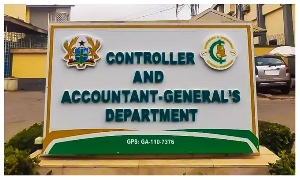Tsatsu Tsikata says the ruling of the Supreme Court of Ghana on March 4, 2021, was very strange, especially the aspects that described the testimony of Dr Michael Kpessa-Whyte and Robert Joseph [Rojo] Mettle-Nunoo as “fanciful tales”.
According to him, the witnesses of John Dramani Mahama gave the court a compelling and truthful account of what transpired in the “Strong room” of the Electoral Commission.
Speaking to KSM on Friday, March 12, Tsatsu Tsikata explained, “The fact that the decision went against us, is part of the reality of court proceedings. In my own estimation, there are a number of aspects of the decision that are somewhat strange.”
“The court tried to set aside the evidence of the two of the witnesses that were presented by John Mahama: Dr Michael Kpessa-Whyte and Robert Joseph [Rojo] Mettle-Nunoo. There was a description of that evidence as ‘fanciful tales’ which is quite extraordinary because the witnesses gave a completely truthful, compelling account of the situation in the Electoral Commission premises on the day that the declaration was supposed to be made,” he stated further.
Tsikata noted that “Mr Mettle-Nunoo particularly gave a very vivid account of the interactions that he had with her [Chairperson of EC] and based on that interaction, he and Dr Kpessa-Whyte had to go on assignment; to go and brief their candidate based on what they were told by the Chairperson. By the time they got to the candidate, she was already making a Declaration.
He indicated that the Petitioners case was clear rather, the 1st Respondent failed to act “according to the law she herself was signatory to; the Constitutional Instrument (CI) which requires her to be the person assembling and collating the results from the Regional Collation Centres and in the presence of the candidate’s agents sorting out whatever issues they had before making a Declaration.”
Background
The Supreme Court in its unanimous judgment that affirmed Nana Addo Dankwa Akufo-Addo as a validly elected President, described the testimonies of two of the petitioner's witnesses, Dr Michael Kpessa-Whyte and Mr Robert Joseph Rojo Mettle-Nunoo as "fanciful tales."
“As for the other two witnesses, that is, Petitioner’s Witnesses PW2 and three; Dr Kpessa-Whyte and Robert Joseph Mettle-Nunoo, the little said about their testimonies relative to the issues at stake, the better. They recounted the fanciful tale of how the chairperson refused to heed their complaints on some irregularities they noticed on some of the collation forms which came from the regions,” Chief Justice Kwasi Anin-Yeboah said.
He went on: “We describe this evidence as fanciful because, despite this alleged protest, they went ahead to verify and certify 13 of 16 regional collation sheets.”
The court said Dr Michael Kpessa-Whyte and Mr Mettle-Nunoo should blame themselves for leaving the National Collation Centre (Strong room), “In fact, regarding the testimonies of PW2 and three, if their evidence is to be believed then they have to blame themselves for abandoning their post at the National Collation Centre at a time the verification and certification of the result were ongoing.”
The court added: “While the testimony of PW1 [Johnson Asiedu Nketia] was emphatic, the testimonies of PW2 [Dr Kpessa Whyte] and 3 [Rojo Nunoo] were in respect of alleged irregularities in the figures or data on some of the Collation Forms that they sighted in the strong room, but after which they ultimately signed or certified.
Notwithstanding all these allegations of misunderstandings with the staff of the 1st Respondent in the strong room and the fact that they were absent during the declaration they did not give any indication as to how these happenings affected the final results announced by the 1st Respondent,” Chief Justice Anin-Yeboah said when reading the final judgement on Mahama’s petition on Thursday, March 3.
He continued: “Having signed or certified these forms, the witnesses, particularly, PW3, cannot turn round to talk of irregularities in the said forms. Their testimonies were, therefore, of no relevance to the issues set down for determination and we find them unworthy whatsoever in the settlement of the issues.”
General News of Monday, 15 March 2021
Source: www.ghanaweb.com













